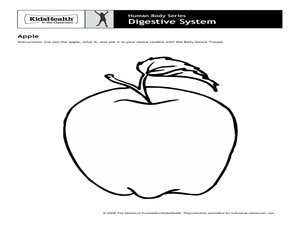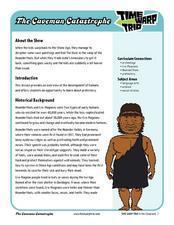Curated OER
Now You See It, Now You Don't
Students explore organic and inorganic objects. In this environmental activity students perform a composting experiment using flowers in different soils. Students record their observations.
Curated OER
Bacteria and Illness
High schoolers research information on bacterium and their relationship to food borne diseases. In this science lesson plan, students complete internet research to construct and analyze the growth cure of common bacterium...
Curated OER
Nutrition
Students create a video incorporating clay animation and skits. Using their video creation, students explain and explore the five basic food groups, nutrition news, nutrients, benefits and food examples. They maintain a food journal,...
Curated OER
Design a Reef!
Young scholars explore coral reef ecosystems. In this ecosystems science instructional activity, students research coral reef ecosystems to determine the major functions the participating organisms must perform. Young...
Curated OER
Louisiana Regional Foodways
Students strengthen their research techniques in locating, selecting, and synthesizing information from a variety of texts, media, references and internet resources to study regional food way traditions in Louisiana. They assess the...
Curated OER
Homeless in our Community
Third graders explore homelessness in their local community. In this service project/social studies lessons, children research local areas where homeless people reside, discuss global acceptance and unity, and visit a local food bank.
Curated OER
The Human Organism
Students identify their feelings and learn constructive ways of handling conflict. In this feelings and conflict lesson, students read a story about conflict and identify ways to understand emotions and resolve conflict.
Curated OER
Food Poems and Base Words
Students identify base words to decipher new vocabulary. In this vocabulary instructional activity, students complete a graphic organizer while reading about food and nutrition. Students discuss simple and complex endings when using...
Curated OER
Food Probability
In this math worksheet, learners plot the possibilities of outcomes for making sandwiches and ice cream in the graphic organizers.
Curated OER
Human Body Series - Digestive System
With articles entitled, "What's Puke?" and "What is a Fart?" this digestive system lesson is sure to be a gas! Elementary anatomists do a belly dance to illustrate how food moves through the digestive system and then design a board game...
NASA
The Cycle of Matter
An educational lesson focuses on the idea of conservation of matter through a demonstration of the water cycle, a discussion of digesting food, and the path of carbon and oxygen atoms as they change form.
Captain Planet Foundation
Worm Your Way Out of This
How can you provide healthy soil for your garden? Study worms, bacteria, and other microorganisms in a lesson about decomposition and organic compost. After discussing what you know about worms and watching a video, watch what worms do...
Curated OER
Feeding Frenzy
Young biologists take a look at the myriad of ways that animals increase their chances of surviving in the wild. The adaptations help animals hide, hunt, and attract a mate. This lesson specifically explores how insect mouth parts are...
Curated OER
Changing Planet: Adaptation of Species (Birds and Butterflies)
A video about the impact of climate change on butterfly populations and a PowerPoint about butterfly and bird adaptations warm science learners up for the activity to follow. Using a variety of tools that reprsent unique styles of bird...
Curated OER
Ego Trip- Exploring the Inner Workings of the Human Body
Students gain an understanding of how systems and organs in the human body work. They create their own fictional account of a trip through the human body, and describe one response the body makes to stimuli.
Curated OER
Lab Experiments in Nutrition
Looking for authentic hands-on nutritional experiments? High schoolers will perform experiments to test for the presence of vitamin C in several solutions as well as the effect of caffeine on Daphnia. They will also consider the...
Field Museum
The Case of Darwin's Finches
One of the most striking pieces of evidence for Darwin's Evolution of Species was his observations of finches and how their beaks differed from island to island, depending on their primary food sources. So what would happen to the theory...
Curated OER
Food for Thought: Hunger???Around the Block, Around the World LESSON 2: Local Hunger and Malnutrition
Students examine the difference between hunger and malnutrition. They study the idea of hunger as a theme in literature while discovering how communities can solve hunger problems.
Curated OER
Exploring Countries and Cultures
Fifth graders choose a country associated with a family member and research its location, government, language, economy, history, holidays, foods, sports, and famous people. They write to inform using this data and draw a map identifying...
Science 4 Inquiry
Edible Plate Tectonics
Many people think they can't observe plate tectonics, but thanks to GPS, we know that Australia moves at a rate of 2.7 inches per year, North America at 1 inches per year, and the Pacific plate at more than 3 inches per year! Scholars...
Captain Planet Foundation
Rotting Away
What happens at the end of a plant's life cycle? Show kids the natural way that plants show that they're decomposing, as well as the importance of compost, with a lesson about living organisms. After reading Log Cabin by Anne Schreiber,...
Utah Education Network (UEN)
Balanced Diet
Second graders investigate the concept of a balanced diet and how the food pyramid is organized. They conduct research using the links included in the instructional activity. They differentiate the parts of the pyramid while looking at...
Curated OER
Food and the Digestive System
Young scholars investigate the digestive system. For this human biology lesson, students read an article about the digestive system and go onto a suggested website to review what they have learned. Young scholars are asked questions as...
Time Warp Trio
The Caveman Catastrophe
Young archaeologists study the development of human history, and work in groups to create a timeline that traces the development of humans. Additionally, the groups utilize a very clever graphic organizer embedded in the plan in order to...
Other popular searches
- Con Pair Organic Foods
- Organic Foods Taste
- Non Organic Foods
- Com Pair Organic Foods
- California Organic Foods
- Compair Organic Foods
- Conpair Organic Foods
- Organic Foods Lesson Plan























